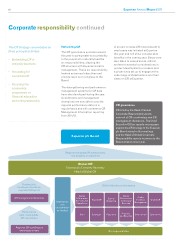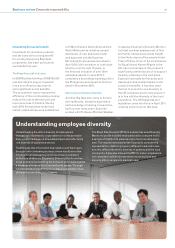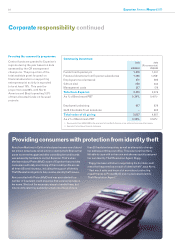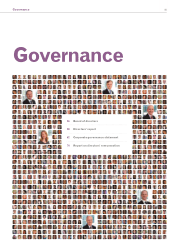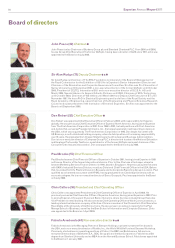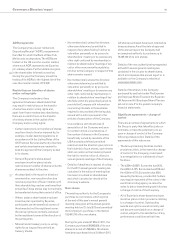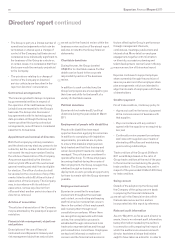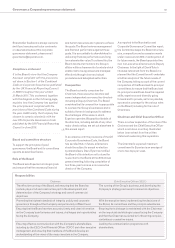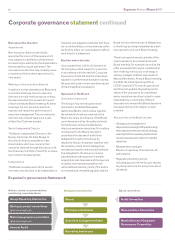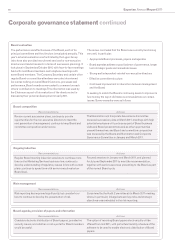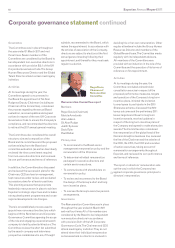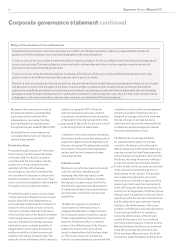Experian 2011 Annual Report Download - page 64
Download and view the complete annual report
Please find page 64 of the 2011 Experian annual report below. You can navigate through the pages in the report by either clicking on the pages listed below, or by using the keyword search tool below to find specific information within the annual report.
62 Experian Annual Report 2011
Corporate governance statement
John Peace,
Chairman
Chairman’s introduction and highlights
Experian is committed to good governance
– we see it as crucial in ensuring that we
conduct ourselves honestly, transparently
and responsibly, and that we are
appropriately accountable to stakeholders.
We see it not as a ‘box-ticking’ exercise,
but as a way of explaining to stakeholders
how the Company and the Board take
decisions to support the continued growth
of our business. The Board has a central
role to play in this regard in promoting
the long term success of the Company, by
implementing a framework of authority,
accountability and risk identification/
mitigation, which at the same time
empowers people to make decisions that
will ensure the continued success of the
business.
It is fair to say that our view of governance
reflects the trends in the regulatory
environment. The new UK Corporate
Governance Code, in particular, places the
emphasis on applying the principles, rather
than the letter of, the Code. Issued in June
2010, the Code does not apply for Experian
until next year, but Experian has chosen
voluntarily to report under the new Code this
year. As Chairman, I am therefore pleased
to accept the UK Financial Reporting
Council’s invitation to provide, through this
governance statement, an insight into how
the principles relating to the role and the
effectiveness of the Experian Board have
been applied.
Some specific examples this year of the
application of these principles are as
follows:
External evaluation – in line with the new
Code, Experian intends that the evaluation
of the Board will continue to be facilitated
externally at least every three years. Prior
to the external facilitation that took place in
2010, the last such evaluation was in 2007.
This year’s evaluation, facilitated by the
Lygon Group, was intended to gain rigorous,
honest feedback from Board members about
how the Board is operating and to look for
areas where there is scope for improvement.
In addition, as part of the review, Board
members were asked to comment on each
others' contribution to Board and committee
meetings. The review also included an
assessment of actions taken since the
last external facilitation, for which there
were no adverse findings. Further details,
including some of the recommendations
and proposed actions from the 2010 review,
appear in this statement.
Governance review – in January and
March 2011, the Board and the Nomination
and Corporate Governance Committee
conducted a thorough review of governance.
This included consideration of the output
of the external board evaluation conducted
in 2010, Board and committee composition
(taking into account the appointment of Sir
Alan Rudge as Deputy Chairman and the
non-executive appointments made in June
2010), and an evaluation of how the Board
should best spend its time, in terms of site
visits, to ensure the appropriate focus on the
business.
Induction and training, new non-executive
directors – since their appointment in June
2010, Judith Sprieser and Paul Walker
have participated in a comprehensive
programme that included: Experian’s
history; strategy; Credit Services, Decision
Analytics and Interactive businesses;
corporate development; finance, audit,
legal, risk, regulatory, human resources,
investor relations and governance; product
demonstrations; and specific geographic
briefings on North America, Latin America,
UK and Ireland, EMEA, Asia Pacific and
India.
Induction and training, full Board – in July
2010, the full Board received presentations
from senior management from the UK
and Ireland business, including details
of strategic initiatives and presentations
on strategic clients. In September 2010, it
was the turn of the North America senior
management to present to the Board,
and they provided a market overview
and update, as well as several product
demonstrations. In January 2011 and March
2011, sessions were presented to the Board
on the Marketing Services business and
information security respectively.
Remuneration engagement – in May
2010, the Chairman of the Remuneration
Committee wrote to the Company’s top
shareholders and others with details of
changes to be made to remuneration
arrangements in 2010 (as reported in
the report on director’s remuneration).
A positive result followed at the annual
general meeting in favour of the 2010 report
on directors’ remuneration.
Refinancing – the Board oversaw
programmes to ensure that maturing
financing facilities were managed on a
timely basis and the necessary financial
resources were in place for the business. We
saw US$1,700m successfully raised through
the bank markets and the issue of £400m of
2018 Euronotes.
Risk reporting – recognising the importance
of identifying risk, the Audit Committee
asked management to continue refining
our reporting, for example, by implementing
a new reporting template in response
to requests for broader commentary on
information security activities. The new
reporting provides a greater focus on
quantitative analysis, and provides a wider
spectrum to include areas of success as
well as opportunities for improvement.
New UK Corporate Governance Code – the
Board and the Nomination and Corporate
Governance Committee have received
updates throughout the year on progress
to ensure compliance with the new UK
Corporate Governance Code. Specific
actions taken in readiness for the new Code
include: updating the terms of reference of
the Board committees; updating my letter
of appointment to clarify that, as already
happens, a culture of openness and debate
is promoted in the boardroom; ensuring that
the risk management framework has a more
formal link between key business objectives
and associated risks; plan agreed in early
2011 to address individual training and
development needs identified by directors;
and all directors standing for re-election at
the 2011 annual general meeting.
66


